Parasit #38-42 (in progress 38-40)
1/58
There's no tags or description
Looks like no tags are added yet.
Name | Mastery | Learn | Test | Matching | Spaced | Call with Kai |
|---|
No analytics yet
Send a link to your students to track their progress
59 Terms
A 5-month-old indoor kitten is brought to your clinic for mild respiratory signs and soft stool. The fecal exam shows ~12 µm round oocysts. What is the most likely source of this kitten’s infection?
Ingestion of sporulated oocysts from the environment
A pregnant woman is referred to your clinic after routine serologic testing reveals a positive IgM titer and negative IgG titer for Toxoplasma gondii. She owns a cat but claims to always wear gloves when handling litter and reports frequently consuming undercooked lamb. What is the most likely source of infection and clinical concern?
Undercooked meat; risk of primary infection affecting the fetus
What is the definitive host of Toxoplasma gondii?
Cats (domestic and wild)
What hosts serve as intermediate hosts for T. gondii?
All endothermic vertebrates (e.g., humans, dogs, sheep, goats, birds)
What two stages of T. gondii are infective to hosts?
Sporulated oocysts and tissue cysts (bradyzoites)
What is the typical transmission route for cats?
Ingestion of tissue cysts in prey or sporulated oocysts from environment
How do intermediate hosts (like humans or livestock) become infected?
Ingestion of sporulated oocysts (e.g., contaminated food/water/soil) or ingestion of tissue cysts in undercooked meat
Where does sexual reproduction of T. gondii occur?
Small intestine of cats (definitive host only)
Where does asexual replication of T. gondii occur?
In tissues of intermediate hosts — especially CNS, muscles, and placenta
What are common clinical signs in cats (DH)?
Usually asymptomatic; may have soft stool, diarrhea, sneezing, lymphadenopathy
What are clinical signs in dogs (IH)?
Neurologic disease, lymphadenopathy, respiratory signs, myositis
What is the primary consequence of T. gondii infection in pregnant ewes?
Abortion storms, especially if infected for the first time during pregnancy
What are the risks of T. gondii in humans with HIV/AIDS?
Reactivation of latent infection → toxoplasmic encephalitis (TE)
What congenital defects can T. gondii cause in humans?
Blindness, hearing loss, learning disabilities, abortion, hydrocephalus, chorioretinitis
What diagnostic techniques are used for T. gondii?
Fecal float (cats), serology (IgM, IgG), PCR, biopsy/necropsy
What does a positive IgM and negative IgG result indicate in humans?
Recent or acute infection
Is Toxoplasma gondii zoonotic?
Yes — especially dangerous to pregnant women and immunocompromised individuals
What public health recommendations exist for pregnant women regarding T. gondii?
Avoid raw/undercooked meat, wear gloves when handling cat litter or soil, wash fruits/veggies, avoid gardening
What is the definitive host of Neospora caninum?
Dogs (domestic and wild)
What are the intermediate hosts of Neospora caninum?
Cattle, dogs, grazing livestock, and wildlife
What are the infective stages of Neospora caninum?
Tissue cysts (bradyzoites) and oocysts
How is Neospora caninum transmitted to the DH and IH?
DH: ingestion of tissue cysts
IH: ingestion of oocysts
Cattle: also vertical (prenatal) transmission
Where does Neospora caninum replicate?
Sexual: small intestine of dogs
Asexual: tissues of DH and IH
What clinical sign is seen in congenitally infected puppies?
Posterior paresis, neuromuscular disease >3 weeks after birth
What reproductive issue does Neospora caninum cause in cattle?
Abortions, especially in dairy cattle
What is a major clinical concern in dogs with Neospora caninum?
Neuromuscular disease; congenital infection with posterior paresis
Why is it important to avoid breeding seropositive dogs?
They may vertically transmit the parasite to offspring
What is a major clinical concern in cattle with Neospora caninum?
Reproductive disease — abortions, abortion storms, fetal infection
Is Neospora caninum zoonotic?
No
What is the definitive host of Sarcocystis cruzi?
Dogs
What is the intermediate host of Sarcocystis cruzi?
Cattle
How is Sarcocystis cruzi transmitted to hosts?
DH: ingestion of tissue cysts in cattle
IH: ingestion of sporocysts while grazing
What are the clinical signs in cattle infected with Sarcocystis cruzi?
Abortion, stillbirth
Eosinophilic myositis
Fever, anorexia, hyperexcitability
Failure to thrive in calves
Is Sarcocystis cruzi zoonotic?
No
How do cattle get infected with Sarcocystis cruzi?
Ingestion of sporocysts from dog feces while grazing
What is a key control method for Sarcocystis cruzi in livestock facilities?
Prevent dog access to feed and pastures
What is the definitive host of Sarcocystis neurona?
Opossums
What is the accidental host of Sarcocystis neurona?
Horses
How do horses become infected with Sarcocystis neurona?
Ingestion of sporocysts in contaminated feed or pasture
What disease does Sarcocystis neurona cause in horses?
Equine Protozoal Myeloencephalitis (EPM)
What are clinical signs of EPM in horses?
Ataxia, stumbling, incoordination
Muscle atrophy, paresis
Recumbency, urinary incontinence, constipation
Is Sarcocystis neurona zoonotic?
No
Can seropositivity for Sarcocystis neurona confirm clinical EPM?
No – many horses are seropositive but asymptomatic
What surface antigen types are associated with EPM treatment resistance?
SAG1 and SAG5 (less responsive); SAG6 (more responsive)
A 4-week-old puppy develops progressive hind limb weakness and eventually cannot walk. The dam appears healthy, and no other littermates are affected. The household is rural and owns cattle. What is the most likely diagnosis?
Neospora caninum
dairy herd experiences a sudden increase in abortions. Over 15% of pregnant cows lose their calves within a short time frame. Histology reveals tissue cysts in fetal brain samples. There are several farm dogs on the property. What is the most likely causative agent?
Neospora caninum
A horse presents with stumbling, incoordination, and muscle atrophy. The owner reports the horse recently began grazing in a new pasture shared with wildlife, including opossums. Serology is positive for IgG antibodies. What is the most likely diagnosis?
Equine Protozoal Myeloencephalitis (EPM) caused by Sarcocystis neurona
A group of feedlot calves shows fever, diarrhea, and muscle tremors. Several develop weakness and weight loss. Necropsy reveals inflammation in vascular endothelium and striated muscle, along with cysts. No neurologic signs are reported. Which parasite is the most likely cause?
Sarcocystis cruzi
A veterinarian observes sporocysts (~15x8µm) on fecal flotation from a healthy adult dog. The owner reports no signs of illness. Which of the following is the most appropriate interpretation of this finding?
The dog is the DH, shedding sporocysts, and does not require treatment
A 4-week-old puppy begins showing signs of progressive hindlimb weakness. The client reports that the dam previously had a litter where two pups died shortly after birth with similar symptoms. The client feeds raw meat occasionally and lives on a cattle farm.
Neospora caninum
On a dairy farm, a spike in abortions has occurred over the last two weeks. The veterinarian suspects a protozoan cause. Which of the following findings would BEST support Neospora caninum as the etiologic agent?
Detection of Neospora tachyzoites in fetal brain or placenta

Which of these are characteristics of Cytauzoon felis?
-Intracellular Haemoportozoan parasite in wild and domestic felidae
-Widely distributed thru out central, south-central US
-Distribution appears to coincide w/ A. americanum (tick)
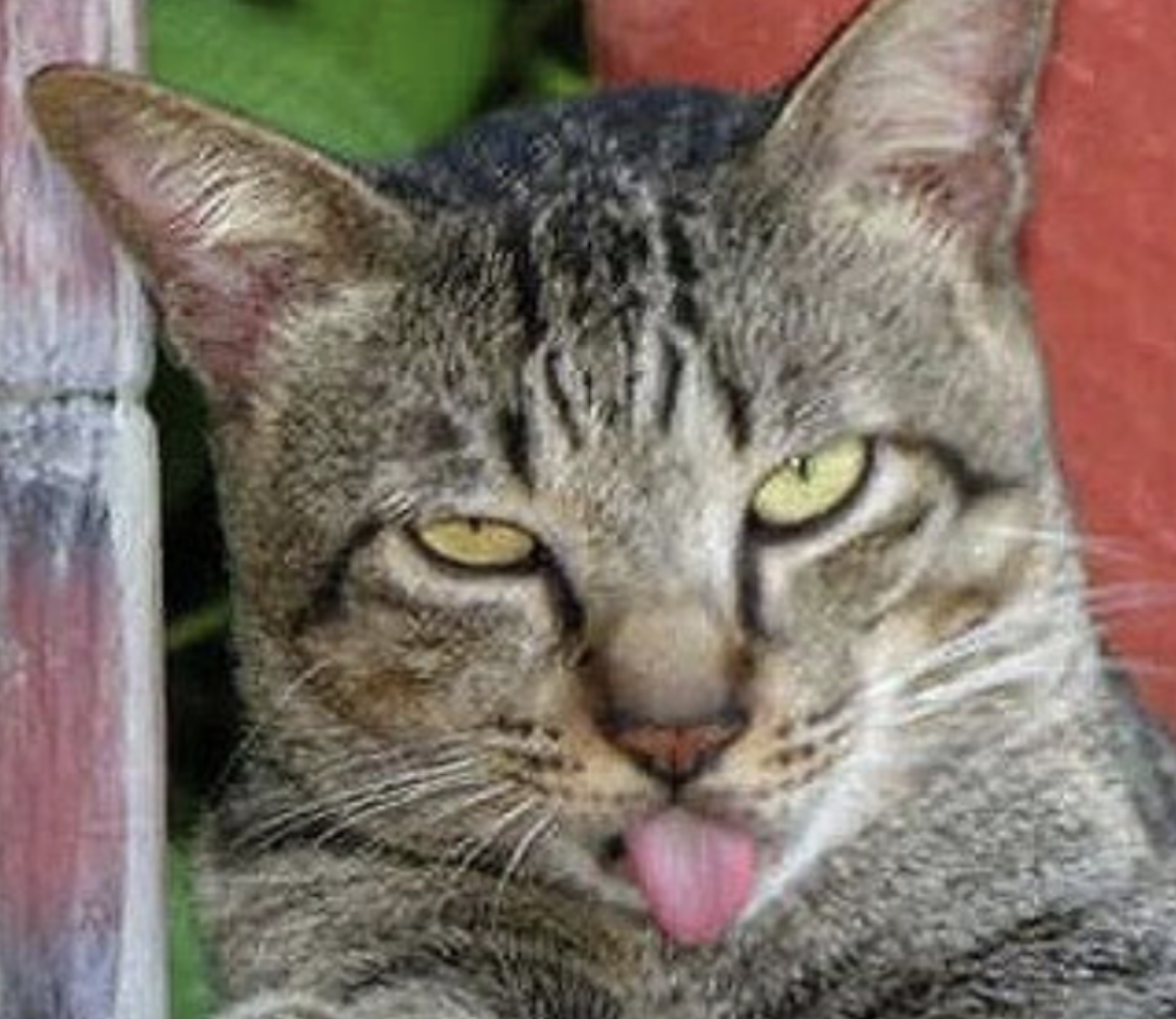
What are the characteristics of Cytauzoon felis?
-Disease associated w/ ASEXUAL replication in macrophages in spleen & tissues
-Engorged leukocytes adhere to walls of veins & organs to cause obstructions
T/F? Schizonts develop into merozoites, rupture host cells, and infect erythrocytes in cats w/ Cytauxzoonosis
True
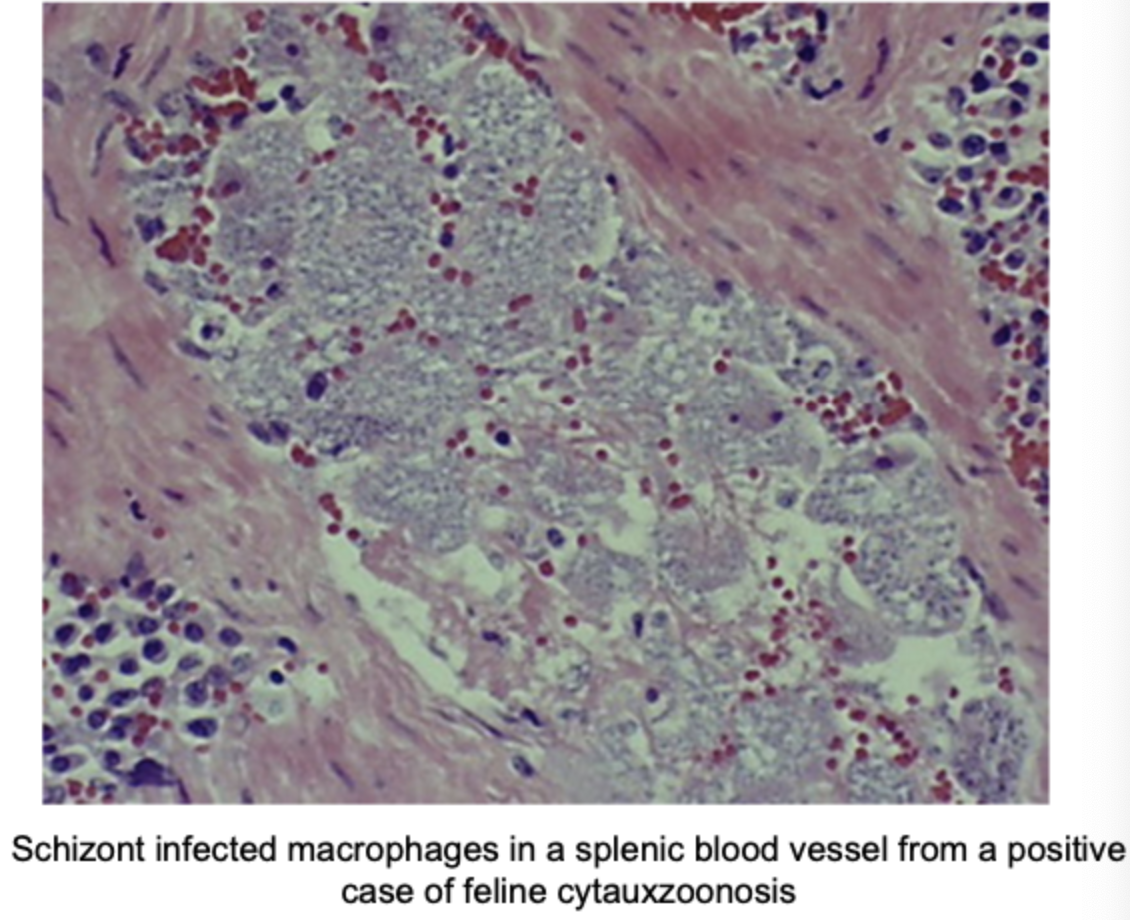
How are cats infected with Cytauxzoon felis?
Cat is BITTEN by an INFECTED A. Americanum (tickt)
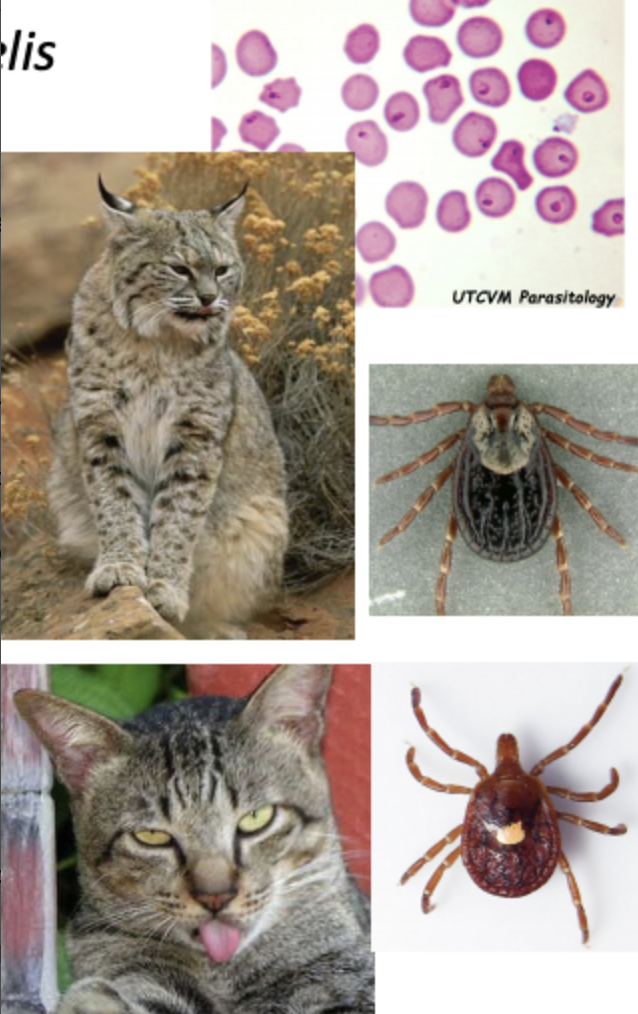
What are the symptoms of feline cytauxzoonosis?
-ICTERIC, pale mm, dehydrated, polydipsic
-Acute lethargy, depression, anorexia
-Advanced cases w/ dyspeni w/ severe bronchointerstitial pulmonary disease
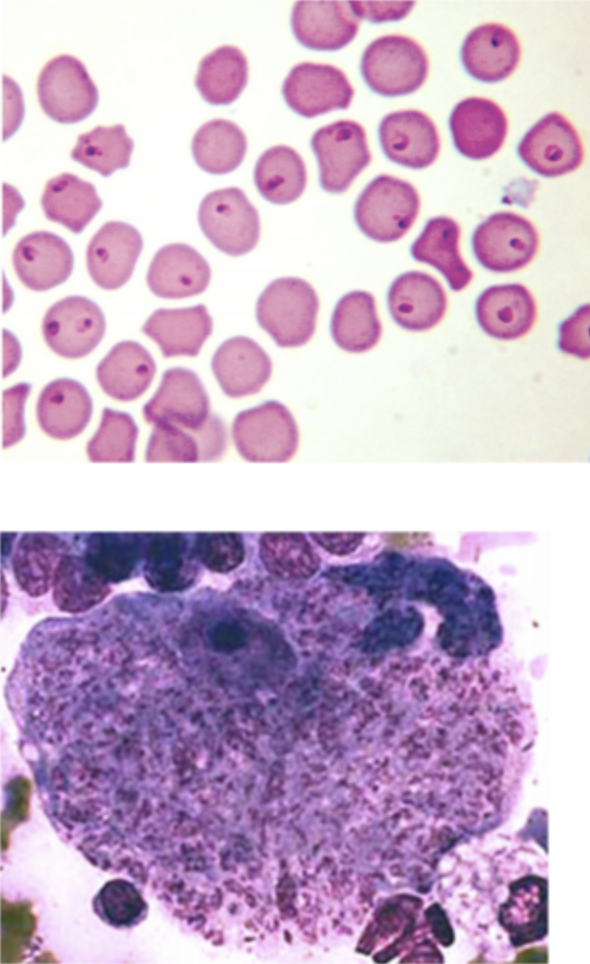
How is feline cytauxzoonosis diagnosed?
-Hematology: leukopenia, non-regenerative anemia, thrombocytopenia
-Clinical chemistry: hyperbilirubinemia, hyperglycemia
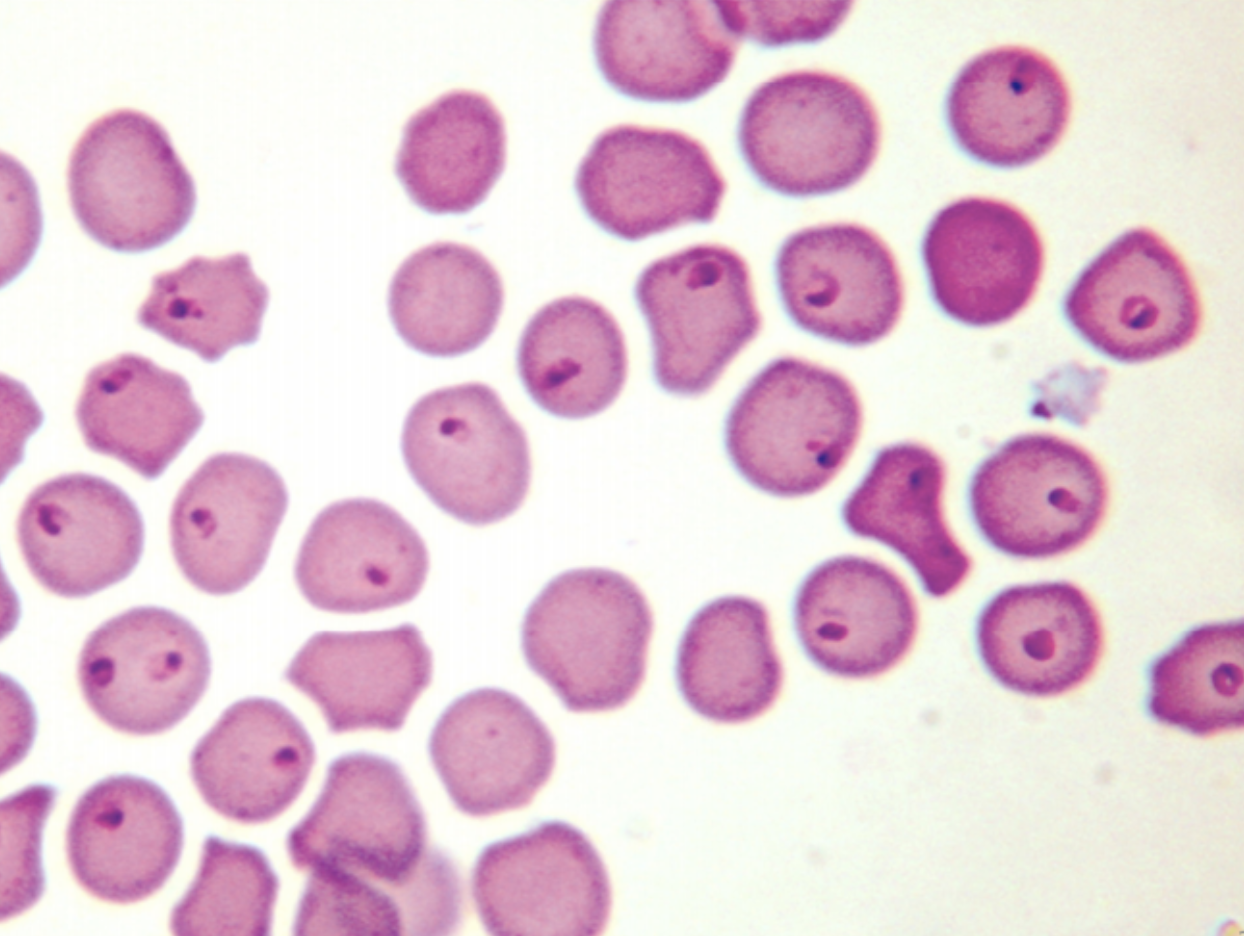
A male DSH presents w/acutely recumbent, inappetent, icteric & the RBC have round-oval pear shaped organisms, diagnosis?
Cytauxzoon felis
What is the goal of treatment of cats infected w/ cytauxzoonosis?
-Therapeutic target is schizogonus stage of organism in WBC
-Terminate asexual reproduction